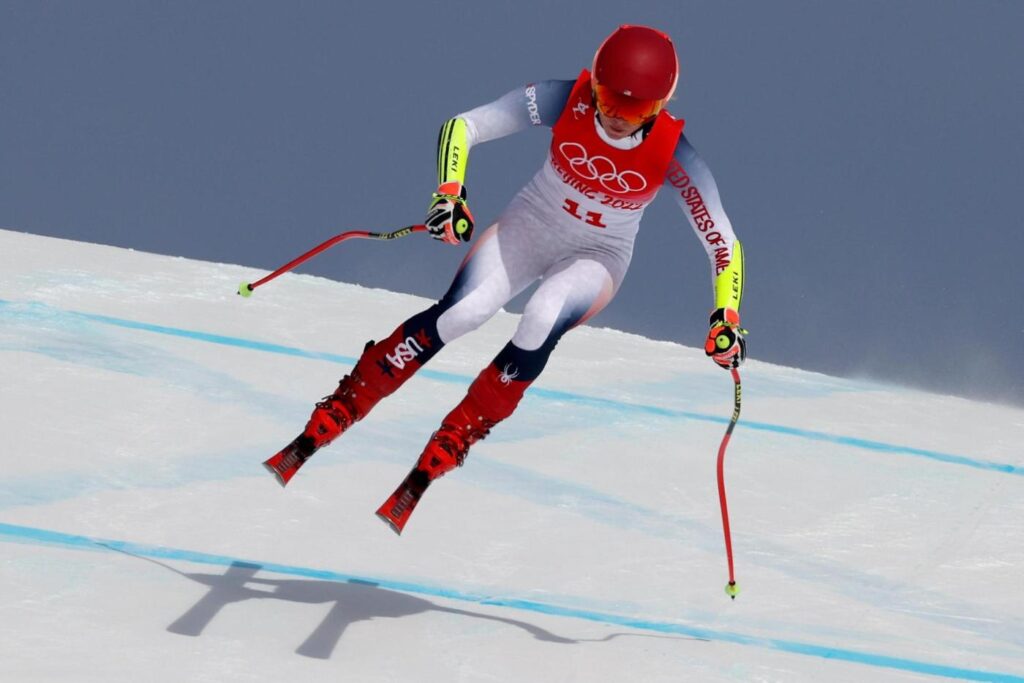
By HOWARD FENDRICH
BEIJING (AP) — Mikaela Shiffrin completed the super-G at the Beijing Olympics on Friday in a time way out of medal contention — but for the first time in three races at the 2022 Games, she made it to the finish.
The two-time Olympic Alpine gold medalist crossed the line at the bottom of a course known as The Rock in an unofficial time of 1 minute, 14.30 seconds. That left the 26-year-old American more than a half-second behind early leader Lara Gut-Behrami of Switzerland.
It also put Shiffrin in eighth place after only 11 of the 44 entrants had taken their turns down the slope.
Shiffrin never had entered a super-G at an Olympics before, although she did win a gold in the event at the 2019 world championship and a bronze at last year’s worlds.
She failed to finish her opening run in the two-run events that preceded the super-G in Beijing: the giant slalom and the slalom, both of which she won at past Olympics.
Shiffrin actually started well enough Friday, reaching the initial check point in 12.66 seconds — ahead of Gut-Behrami’s pace.
But from there, Shiffrin lost touch with the leader, losing hundredths, then tenths, of seconds along the way.
The Beijing Olympics hardly went to plan for Shiffrin at the outset. Couldn’t have gotten off to a worse start, really.
First came Monday’s giant slalom, which she won at the 2018 Pyeongchang Olympics. She teetered out of control and failed to properly handle a turn after five gates — her day was done about 10 seconds into the first leg of a two-run event.
That was followed by Wednesday’s slalom, which she won at the 2014 Sochi Games to become, at 18, the youngest women’s champion in that race in Olympic history. Quite similar to the GS, she skidded wildly on a turn after five gates — this time, her day was done five seconds into the first leg of a two-run event.
What was so hard for fans, and Shiffrin, to believe is that not only are the slalom and giant slalom her two best races, and have been for years, but she almost never makes the sort of mistake that results in a “Did Not Finish” next to her name on the result sheet.
The flub in the giant slalom created her first “DNF” in that event since Jan. 23, 2018, a streak of 30 races. Her 47 World Cup slalom wins are more than any other skier in any Alpine event in history.
After that second surprisingly quick exit Wednesday, Shiffrin cast some doubt on whether she even would be on the slope Friday, saying: “If I’m going to ski out on the fifth gate, like, what’s the point?”
But then she went out Thursday with other athletes for the two allowed practice trips on the super-G competition hill. A few hours later, the U.S. ski team announced that Shiffrin would, indeed, be on the start list.
Related Articles
Doping hearing to decide Russian skater’s Olympic fate
2022 Winter Olympics: Friday Feb. 11 TV schedule (West Coast times)
Mikaela Shiffrin enters super-G after training goes ‘well’
2022 Winter Olympics: February 10 TV Schedule (West Coast times)
Nathan Chen finds redemption with Olympic gold medal
About 4 1/2 hours before Friday’s race began, Shiffrin posted on Twitter, writing: “Today is Super G, and Super G is fun. I can’t express how grateful I am to have the opportunity to refocus on a new race, in the sport that I love so much. Onward.”
She also said: “I’ve had a lot of support over the last 48 hours and I have to thank everyone for that.”
The next women’s Alpine event is the downhill on Tuesday. While Shiffrin planned to enter all five individual races in Beijing, it’s not known for sure whether that actually will end up happening.
